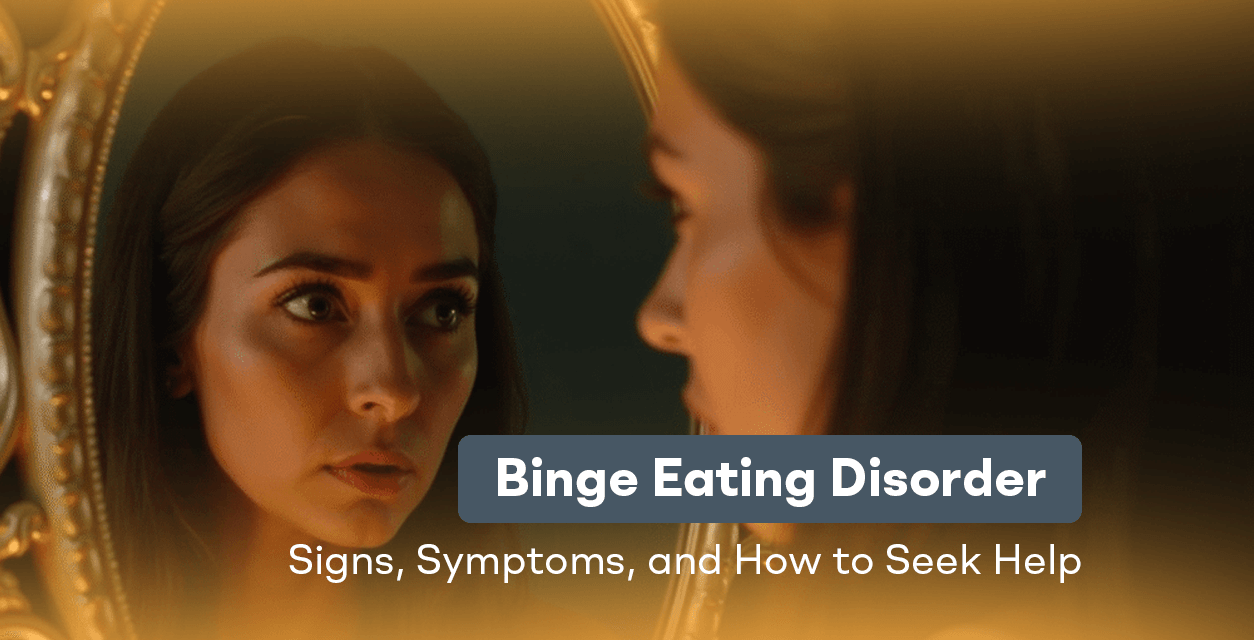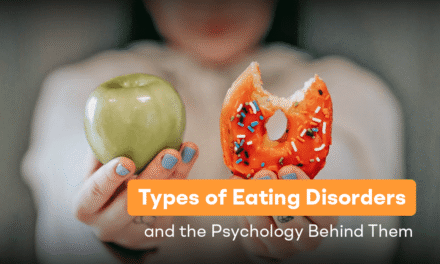You may occasionally overeat during a celebration or holiday meal. After all, everyone does!
But when patterns of consuming large amounts of food occur regularly and are tied to emotional distress, it may signal something more serious. This is referred to as a binge eating disorder.
But what is binge eating disorder? It is a recognized mental health condition that affects millions of individuals worldwide. It involves recurring episodes of eating unusually large quantities of food, often in secret and without control, followed by feelings of guilt or shame.
Unlike other eating disorders, it does not usually involve purging behaviors, which makes it harder to recognize at first. Understanding this disorder is essential, as it not only impacts physical health but also deeply affects emotional well-being.
So, let’s continue reading to explore the causes, signs, and symptoms of binge eating disorders and the paths available for treatment and healing.
What Causes a Binge Eating Disorder?
Understanding the roots of this condition is key to recognizing triggers and seeking proper help. While no single factor explains it fully, research points to a mix of psychological, biological, and social influences that contribute to its development.

1. Emotional Triggers
Many people use food as a way to cope with stress, sadness, or anxiety. Emotional struggles often overlap with the disorder of binge eating, which makes it harder to break the cycle without addressing underlying feelings.
2. Biological and Genetic Factors
It is a known fact that genetics, brain chemistry, and hormonal imbalances can all cause binge eating disorder. These biological elements may increase vulnerability and make cravings more intense.
3. Social and Environmental Pressures
Cultural messages around body image, dieting, and appearance can play a strong role in shaping behavior. For some, these pressures contribute to developing binge eating disorder through constant exposure.
Signs That You or Your Loved One Has a Binge Eating Disorder
Recognizing early warning signals is important if you want to get or give help in time. Below are some indicators that may appear differently in each person, but being aware of common red flags helps in seeking guidance before the disorder worsens.
1. Emotional and Behavioral Changes
Shame, secrecy, and distress around eating are common patterns. Sudden mood swings, guilt after meals, or avoidance of social events tied to food can signal deeper struggles with mental health, which require careful attention.
- Read Our Guide: Food and Mental Health
2. Physical and Eating-Related Patterns
One of the most overlooked signs and symptoms of binge eating disorders is consuming large amounts of food quickly. This may be followed by discomfort, skipped meals to “compensate,” or frequent dieting attempts.
3. Coexisting Conditions
Various individuals experience binge eating disorder and depression together. Feelings of worthlessness, withdrawal from activities, or constant fatigue often overlap with disordered eating and reinforce cycles that make recovery more challenging.
4. Loss of Control While Eating
A core marker of an eating disorder of this kind is the inability to stop once eating begins. This loss of control can occur even when not hungry, leaving individuals feeling powerless and overwhelmed afterward.
5. Frequent Food Hoarding or Secret Eating
Another sign of binge eating disorder is hiding food or eating in private to avoid judgment. This behavior reflects the inner conflict between intense cravings and shame, making the disorder harder to detect from the outside.
- Read Our Guide: What Are Eating Disorders?

Treatment Options for People with Binge Eating Disorder
Managing binge eating disorder requires a multi-faceted approach that addresses both physical health and emotional well-being. Effective care often combines therapy, medication, and lifestyle strategies, which help individuals build sustainable changes rather than short-term fixes. Professional support also plays a role by ensuring that recovery is guided and compassionate.
Common approaches to binge eating disorder treatment include the following.
- Cognitive Behavioral Therapy (CBT): This is the most common form of therapy for binge eating. It helps individuals identify thought patterns that trigger overeating and replace them with healthier coping mechanisms.
- Medication: In some cases, doctors may prescribe antidepressants or medications that regulate appetite. These support long-term progress when combined with therapy.
- Nutritional Counseling: Working with a dietitian helps individuals rebuild a balanced relationship with food and focus on nourishment rather than restriction.
- Support Groups: Connecting with others facing the same challenges reduces isolation and builds accountability.

Conclusion
In order for you to understand and address binge eating disorder, you will need to practice compassion, awareness, and timely support. With the right treatment, healthy coping strategies, and consistent care, recovery is possible.
At the end of the day, raising awareness about its causes, signs, and risks helps reduce stigma and ensures more people seek the help they deserve.
FAQs
How can I stop a binge eating disorder?
Stopping a binge eating disorder involves seeking professional help through therapy, medical guidance, and nutritional counseling. Developing healthier coping strategies, practicing mindful eating, and joining support groups can make recovery more manageable.
What causes binge eating disorder?
Several factors cause binge eating disorder, including genetics, emotional stress, trauma, and imbalances in brain chemicals that regulate appetite and mood. Cultural pressures around body image and dieting may also contribute.
What is a binge eating disorder?
A binge eating disorder is a serious mental health condition where individuals repeatedly consume unusually large amounts of food in short periods. Unlike bulimia, it does not involve purging. It leads to guilt, distress, and loss of control, and requires medical and psychological treatment for recovery.
Health risks of binge eating disorder
Binge eating disorder carries serious health risks. Physical consequences include obesity, type 2 diabetes, heart disease, and high blood pressure. Emotional risks include anxiety, depression, and low self-esteem.
How to recover from binge eating disorder?
Recovery from binge eating disorder combines therapy, medical support, and lifestyle adjustments. Cognitive behavioral therapy and nutritional counseling provide tools for change. Support groups and professional guidance help build accountability and confidence.




